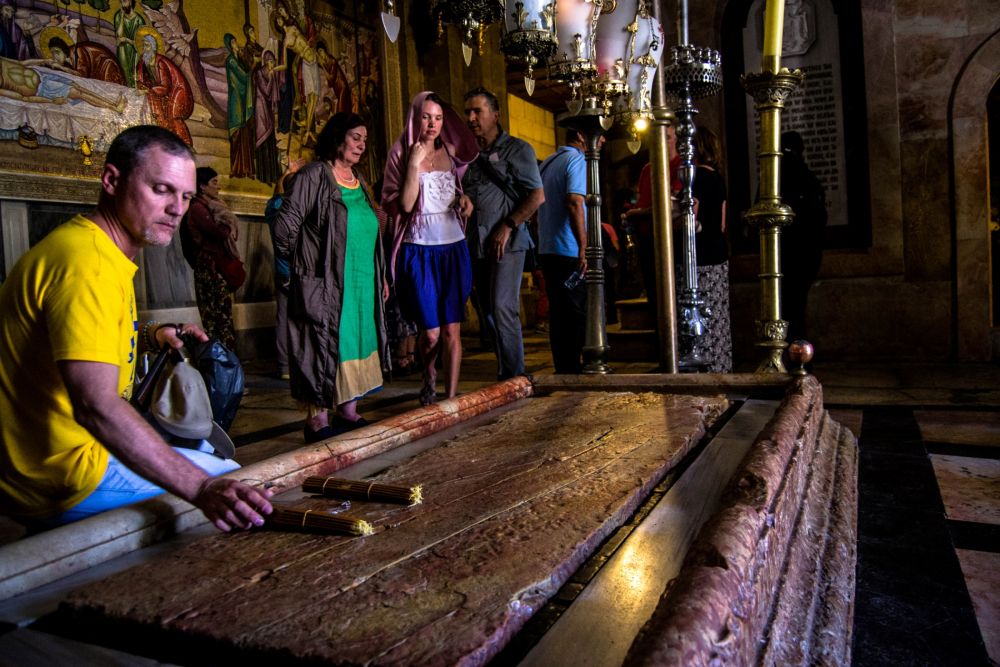
The Easter of the ATS pro Terra Sancta volunteers, HERE in Jerusalem
HIC, Latin word for “here“, is a recurring word in the Franciscan liturgies for Easter. The Latin adverb is strongly connected to the places that mark the moments of the Passion of Christ: here at Mount Zion Jesus celebrated the Easter dinner with his disciples , here in Gethsemane Jesus prayed to the Father before he was arrested, here he was condemned to death on the cross, here his voice resounded as in the Gospel reading of the Easter Vigil at the Holy Sepulcher: “Why do you seek the living among the dead?” (Lk 24, 5-6).
Here, in Jerusalem, those who have the opportunity to be in the Holy City in these days live a unique experience. Among the lucky ones, in addition to the many pilgrims who come from all over the world specifically for the occasion, there are also the many volunteers of ATS pro Terra Sancta. We asked some of them to tell us about their experience and explain what it means to be here during this time.
For Eleonora, a twenty-five year old graduate in the history of art, it’s her frist time in Jerusalem; she confesses, that despite being a believer, she had not felt a particular desire to visit the Holy City: “My faith did not feel the need because it goes beyond the physicality of the place, but by participating in Franciscan ceremonies I understood the historical value of where I am “. Eleonora in Jerusalem puts her studies at the service of helping ATS pro Terra Sancta and the Franciscan friars in preserving the immense artistic and cultural heritage. Also her colleague Anaïs, a volunteer of French nationality, thanks to her service, rediscovered the meaning of some values of the Christian tradition: “Very interesting is the moment Funeral Procession on Good Friday on Calvary: thanks to the Franciscans I discovered traditions that we have lost in West. Participating in the liturgies with the local community and with pilgrims from all over the world made me feel part of the universal Church ”. For her, very young, it is the first experience abroad: “I do not deny that being away from one’s family on Easter Day is a sacrifice, but it is a sacrifice that I want to make in the name of Christ”.
Not for everyone is the first Easter spent in Jerusalem: for Martina, 25, a volunteer in the General Library of the Studium Biblicum Franciscanum, is the second year: “When Jerusalem becomes your home, in the hectic daily life, we tend to forget what happened two thousand years ago, but sharing moments like Palm Sunday and following a path of faith through the liturgies with the friars and other volunteers helps me focus on the most important thing: everything happened here “.
Martina, in addition to her commitment in the library, helps the novice friars in the study of the Italian language (the Franciscan friars from all over the world must, in fact, know the language of St. Francis). Like her, Marta, 50, and Andrea, 26, also teach Italian to the young seminarians of Bethlehem. “My students are helping me to live Easter with greater intensity,” Andrea tells us, “in correcting their homilies and reflections I find myself meditating with them on this event that changed the world.” “I too have shared many moments of prayer with my students,” adds Marta, “In Bethlehem young children participate with their families in these rites, much more than in my parish in Milan!”
Staying with a family is very important in times of celebration, but all the volunteers agree that although it is difficult to be away from loved ones, the opportunity to be in Jerusalem on Easter days is worth the sacrifice. This is also the case for Antonio and Massimo, two sixty-year-olds who have just retired, one from the hot South and the other from Milan, born just a few days apart, love to call themselves “different twins”. Both left their families in Italy for a few months to devote themselves to a volunteer experience in the Holy Land. Antonio, at the Terra Sancta Museum, the archaeological museum of the Franciscan Studium located at the first station on the Via Dolorosa, experienced the diversity of participation in the Christian faith: “The whole Christian world passed before my eyes as I worked: in the place in to which Jesus was condemned and scourged I saw the universality of the message of Christ “. Even Massimo was struck by the crowd that comes these days. “The confusion in the streets and in the Holy Places initially frightened me, but it made me think of the time of Jesus: the chaos of the market that there will have been and the people who, perhaps, did not pay attention to a man who struggled along the same way I walk today, he carried a cross on his shoulders.”
Those who live here for a while become familiar with these places, learn to know them and see their universal message, sometimes hidden in the everyday life of a tourist city like today’s Jerusalem. But here the prophetic words of the Master are realized that, when he is rebuked by the Pharisees for the confusion created by the joyful and joyful crowd that welcomes him on the Mount of Olives on Palm Day, he replies: “I tell you, if they (the crowds) ) will keep quiet, the stones will cry out “. (Lk 19:39).